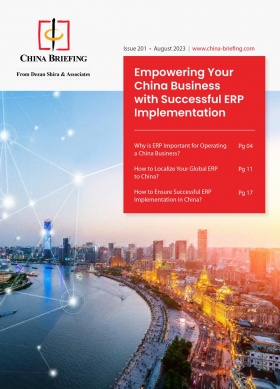Shanghai and Beijing Take Crucial Step in Liberalizing Cross-Border Capital Transfer
Shanghai and Beijing have initiated significant reforms to ease restrictions on foreign capital in China, allowing free RMB exchange and unrestricted fund transfers for legitimate foreign investments. The reforms will help foreign companies in business planning and to navigate investment opportunities.
Shanghai and Beijing have taken a significant step in improving conditions for foreign companies by allowing the free exchange of the RMB under the current account.
The two cities simultaneously announced plans to support unrestricted fund transfers related to legitimate foreign investments, streamlining the inflow and outflow of capital. This signals a significant relaxation of restrictions on foreign capital and is a major reform under the capital account. China’s alignment with international standards in this area is also crucial for the further internationalization of the RMB, making it one of the most significant reforms since the RMB became part of the IMF’s Special Drawing Rights (SDR).
Currently, China imposes strict rules on the cross-border transfer of money; the transfer of funds outside of China is subject to certain restrictions and approval procedures.
In addition to facilitating the internationalization of the RMB, it is hoped that the new policy will boost foreign investment in China, a priority area for the Chinese government in the post-COVID recovery era. Streamlining capital transfers will aid in business planning and investment decisions.
The Chinese government has taken steps to ease restrictions on the cross-border use of funds in China. In June 2023, China’s monetary authorities upgraded a cash pooling pilot program, which enables multinationals in specific regions to integrate cash pools consisting of both RMB and foreign currency, further facilitating the cross-border utilization of funds. The most recent revision of the pilot program provides enhanced flexibility to participating multinationals, allowing them to determine the collection ratio for foreign debt and overseas loans.
Shanghai’s new implementation plan for enhancing the environment for foreign investors, which announces the liberalization of capital transfer, has already been approved and came into effect retroactively from September 1, 2023, while Beijing is soliciting feedback from the public on its plan until October 19, 2023.
Free transfer of foreign capital: Applicable areas in Shanghai and Beijing
Shanghai
In Shanghai, the new policy will apply to the Shanghai Pilot Free Trade Zone (FTZ) and the Lingang New Area, both of which are situated in Shanghai’s eastern Pudong District.
The Shanghai Pilot FTZ and Lingang New Area provide various types of incentive policies for foreign companies, including a reduced 15 percent corporate income tax (CIT) (down from the 25 percent national standard) for certain eligible companies.
The Shanghai Pilot FTZ is already home to many MNCs and FIEs, including Tesla, Covestro, and Allergan. As the main hub for foreign investors and multinationals in Shanghai, the relaxation of capital transfer in this region will have a wide-reaching impact.
The document released by the Shanghai Municipal Government on September 22 contains several measures to enhance international trade and investment in the Shanghai Pilot FTZ. These include various measures to promote the trade of goods and services, facilitate temporary entry of business personnel, and promote the development of digital trade.
In order to “increase efforts to optimize the business environment”, the document states that “the Shanghai Pilot FTZ and Lingang New Area should allow all transfers that are legitimate and compliant and related to the investment of foreign investors to be remitted freely in and out without delay.”
The eligible funds for free transfer include the wages and other legal income of foreign employees of foreign-invested enterprises (FIEs) and employees in Hong Kong, Macao, and Taiwan. The measures also state that no unit or individual can impose restrictions on the currency, amount, or frequency of inward and outward remittances.
Beijing
In Beijing, the policy will apply to the whole city, allowing “the wages and other legal income of foreign employees of foreign-invested enterprises and employees from Hong Kong, Macao, and Taiwan to be freely remitted abroad in accordance with the law.”
Further “measures shall be taken to facilitate the purchase of foreign exchange for the outbound transfer of legitimate income on a regular basis for qualified overseas talents employed by enterprises.”
It is important to note that the Beijing document is currently in draft form and subject to public comment and that this policy is therefore not yet in effect.
Other measures to optimize the business environment for foreign businesses
Streamlined business visa in Shanghai
In addition to the relaxation of capital transfers, Shanghai also announced that the family members of experts employed by FIEs registered in the Shanghai Pilot FTZ and Lingang New Area that are internally transferred can enjoy streamlined port visa processing. Under the new policy, port visa authorities will issue family members an S2 visa on arrival, and a 30-day single-entry visa.
Once the accompanying family members have entered the country, they may apply for an S2 visa with the same validity period (up to five years) and duration of stay (up to 180 days) as the visa held by the accompanying expert. If the expert resides in Shanghai for an extended period, their family members may also apply for a private affairs residence permit with the same validity period as that held by the expert.
Optimized cross-border data transfer in Beijing
The Beijing measures propose streamlined measures for the cross-border data transfer for FIEs in the city.
Under China’s current data and personal information (PI) protection regulations, companies that wish to transfer a certain volume of data (or certain type of data) overseas will be required to undergo certain procedures, which could include a security assessment, third-party certification, or signing a standard contract. Due to the added administrative burden, these requirements have become a particular concern for foreign companies.
The proposed measures include implementing “systems for the cross-border security assessment of data for FIEs, PI protection certification, and the record-filing of standard contracts for the cross-border transfer of PI.”
The measures also state that Beijing’s municipal cyberspace department will formulate specific measures to establish a “green channel” for eligible FIEs, to facilitate security assessments for the outbound transfer of “important data” and PI, as well as formulate a list of “general data” that is not subject to export restrictions.
These proposals are in line with a recent set of opinions released by the State Council on optimizing the environment for foreign investment, which included proposed measures to facilitate cross-border data transfer for multinationals.
At the time of writing, neither the central government nor the Beijing municipal government has released details on the implementation of the green channel or the general data list.
Impact of the new measures of foreign investment in China
The liberalization of China’s foreign exchange market is a significant step toward improving the environment for foreign companies in China. Enabling the free transfer of funds for foreign companies will allow for much more flexibility and will help companies better manage the funds of their Chinese investments. For instance, foreign companies will now be able to quickly inject capital into their China business, which may be required for unexpected payments or penalties, or in the event that earnings are lower than expected.
It will also facilitate the repatriation of funds for foreign companies and their employees, which will reduce perceived risks for foreign companies and their employees when deciding to move to and expand their business in China.
The Chinese government has issued several measures in recent months to attract more foreign investment, which it sees as having an important role to play in China’s post-pandemic economic recovery. In August, the State Council issued 24 measures aimed at boosting foreign investment, which ranged from measures to boost R&D to strengthening intellectual property rights.
However, many of these measures have thus far been proposed in principle only, and have not yet been implemented in practice. The relaxation of cross-border fund transfer therefore represents a tangible effort to improve conditions for foreign companies, albeit in a limited area.
At the same time, the Shanghai Pilot FTZ is generally regarded as a “test bed” for potential nationwide policies, and it is therefore possible that the government will relax requirements on overseas capital transfer to more areas in years to come, depending on the outcome of the program in Shanghai and Beijing.
About Us
China Briefing is written and produced by Dezan Shira & Associates. The practice assists foreign investors into China and has done so since 1992 through offices in Beijing, Tianjin, Dalian, Qingdao, Shanghai, Hangzhou, Ningbo, Suzhou, Guangzhou, Dongguan, Zhongshan, Shenzhen, and Hong Kong. Please contact the firm for assistance in China at china@dezshira.com.
Dezan Shira & Associates has offices in Vietnam, Indonesia, Singapore, United States, Germany, Italy, India, Dubai (UAE), and Russia, in addition to our trade research facilities along the Belt & Road Initiative. We also have partner firms assisting foreign investors in The Philippines, Malaysia, Thailand, Bangladesh.
- Previous Article China Releases Three-Year Action Plan for Metaverse Industry Development
- Next Article China’s Digital Yuan App Gets a Boost: New Features Enhance Convenience for Foreign Users








